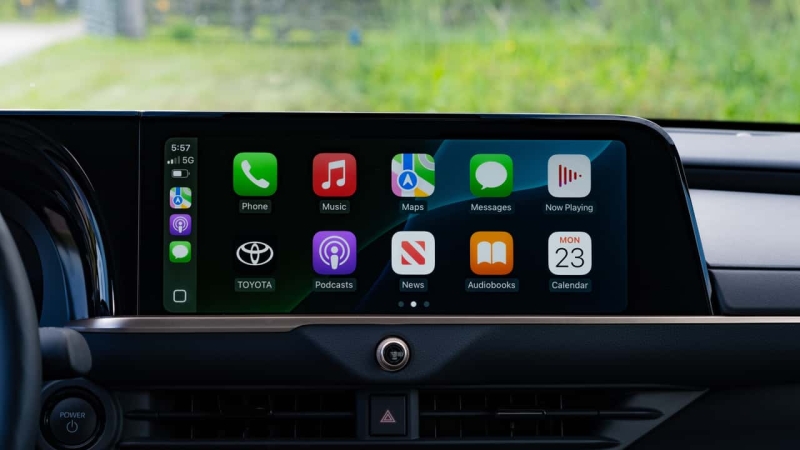Instead of bucking against Apple or Android, Toyota’s infotainment system cements itself as a strong alternative.
Toyota
Good in-car infotainment systems are hard to find, especially when every automaker thinks their tech can topple Apple or Android. Very rarely do they even come close. But instead of bucking against the trends, one company decided to lean into the smartphone aesthetic: Toyota.
Toyota ditched its horrible Entune infotainment system in 2021 and introduced the new-and-much-improved Audio Multimedia System. It’s so good, the system doesn’t even need a clunky name. The idea, Toyota said, was to make the system cleaner, more intuitive, and easier to use—you know, like a smartphone. Mission accomplished.
| Quick Specs | 2024 Toyota Crown Platinum |
| Touchscreen | 12.3 Inches |
| Instrument Cluster | 12.3 Inches |
| Apple CarPlay / Android Auto | Wireless |
| Subscription Costs | $15-$25 |
Toyota’s new infotainment system works on a few different screen sizes, ranging from as small as 8.0 inches on cars like the Corolla to a whopping 14.0 inches on trucks like the Tundra. And they’re all landscape-oriented—so no super tall screens in any Toyota models. The 2024 Toyota Crown Limited I tested falls right in between the other two at 12.3 inches. It’s joined by a 12.3-inch digital instrument cluster just ahead of the steering wheel.
At first glance, the screen looks very much like a modern smartphone. The big, crisp graphics are visible from the outside of the car and the layout is clean and simple. There isn’t a traditional home screen, per se. Instead, Toyota consolidates the most important options like navigation, audio, and smartphone mirroring to a single vertical bar on the left-hand side of the screen.
Having that static “bar” on the left side of the screen makes it easy to access most things while on the move. It isn’t configurable like some other setups, not that it needs to be. And you will have to do some digging for more advanced functions—but that’s not uncommon in most cars. And honestly, it’s even less offensive here. Otherwise, everything you need is merely a click or two away.
The navigation system mimics Apple and Google Maps in cleanliness and ease of use. Scrolling, pinching, and zooming are no problem. If you pay for Toyota’s Connected Services with the Drive Connect Navigation (which costs an extra $15 a month), you get points-of-interset search capabilities, up-to-date navigation, and the “Hey, Toyota” voice assistant.
Like most voice assistants, Toyota’s is hit-and-miss. You can say “Hey, Toyota” (loudly) or push the voice command button on the steering wheel before dishing out a command. When it works, it’ll do things like change the radio station or set the temperature, recognizing (via overhead microphones) whether or not the command comes from the driver or passenger. So if your passenger says, “Hey, Toyota, set the temperature to 69 degrees,” the system will change the temperature just for the passenger. It’s pretty nifty.
Apple Music and Amazon Music are both baked into the system natively, but you will have to pay an extra $15 a month for the Integrated Streaming option (noticing a pattern here?). Otherwise, wireless Apple CarPlay and Android Auto are standard across all screen sizes, and you can just stream your music from there.
Apple CarPlay and Android Auto work flawlessly. The wireless connection is easy to set up and never disconnected or hesitated in my week with the car. One small complaint is that there’s no physical home button, which means the only way to get back to Toyota’s infotainment system is by clicking the Toyota icon on-screen.
The Apple icons look excellent on Toyota’s bright, high-definition screen. The screen also has no glare—a chief complaint of the previous system. A special coating keeps it glare-free while also limiting smudges and fingerprints. There were still some fingerprints during my use, but not nearly as many as other systems I’ve tested. A few quick wipes with a dry microfiber towel and they were gone.
Toyota does have a smartphone app where you can set up a user profile with specific settings, and use it as a digital key. But as with most of these apps, the functionality seems pretty limited—it feels like an unnecessary extra step.
Of course, if you want all the best features you will have to pay for them. The tablet-sized 14.0-inch screen almost always requires an upgrade to the higher trim level (if it’s available in that model at all), and nearly all of the connected services require a monthly subscription. As I mentioned, Integrated Streaming is $15 a month, Drive Connect navigation is also $15 a month, and Wi-FI is an extra $25 a month. You can bundle music and navigation into a single Premium package, but that still costs $25 a month.
Subscriptions aside, though, Toyota’s Audio Multimedia System is easily my favorite infotainment system on the market today. Instead of automatically switching over to Apple CarPlay, I had no problem keeping Toyota’s interface active for most things. It looks good, the graphics are crisp, and it’s easier to use than almost any other system. Sure, you will have to pay extra for certain things—but they’re worth it.
Jeff Perez / Motor1



